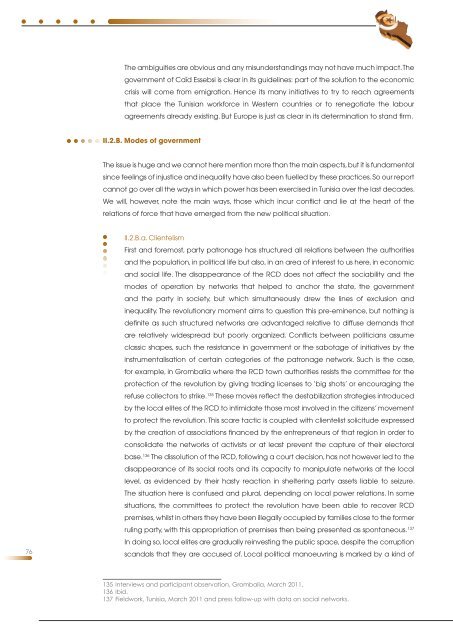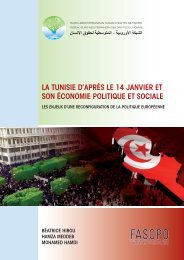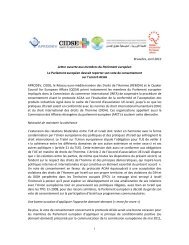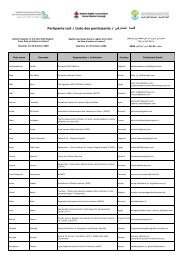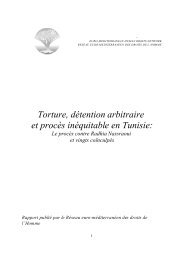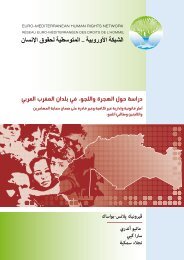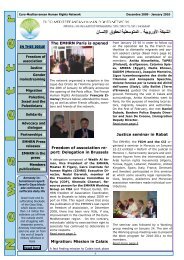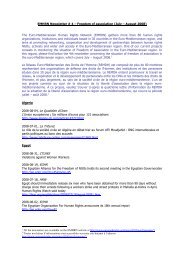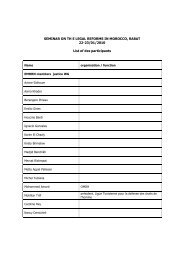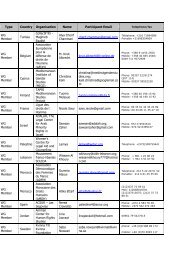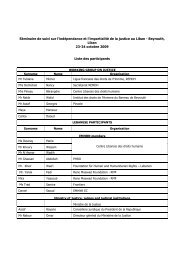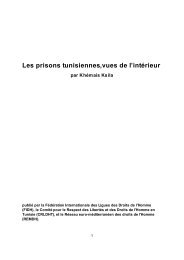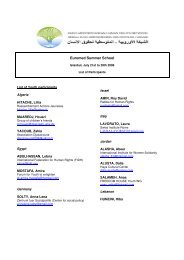tunisia after 14 january and its social and political economy - Refworld
tunisia after 14 january and its social and political economy - Refworld
tunisia after 14 january and its social and political economy - Refworld
You also want an ePaper? Increase the reach of your titles
YUMPU automatically turns print PDFs into web optimized ePapers that Google loves.
The ambiguities are obvious <strong>and</strong> any misunderst<strong>and</strong>ings may not have much impact. Thegovernment of Caïd Essebsi is clear in <strong>its</strong> guidelines: part of the solution to the economiccrisis will come from emigration. Hence <strong>its</strong> many initiatives to try to reach agreementsthat place the Tunisian workforce in Western countries or to renegotiate the labouragreements already existing. But Europe is just as clear in <strong>its</strong> determination to st<strong>and</strong> firm.II.2.B. Modes of governmentThe issue is huge <strong>and</strong> we cannot here mention more than the main aspects, but it is fundamentalsince feelings of injustice <strong>and</strong> inequality have also been fuelled by these practices. So our reportcannot go over all the ways in which power has been exercised in Tunisia over the last decades.We will, however, note the main ways, those which incur conflict <strong>and</strong> lie at the heart of therelations of force that have emerged from the new <strong>political</strong> situation.76II.2.B.a. ClientelismFirst <strong>and</strong> foremost, party patronage has structured all relations between the authorities<strong>and</strong> the population, in <strong>political</strong> life but also, in an area of interest to us here, in economic<strong>and</strong> <strong>social</strong> life. The disappearance of the RCD does not affect the sociability <strong>and</strong> themodes of operation by networks that helped to anchor the state, the government<strong>and</strong> the party in society, but which simultaneously drew the lines of exclusion <strong>and</strong>inequality. The revolutionary moment aims to question this pre-eminence, but nothing isdefinite as such structured networks are advantaged relative to diffuse dem<strong>and</strong>s thatare relatively widespread but poorly organized. Conflicts between politicians assumeclassic shapes, such the resistance in government or the sabotage of initiatives by theinstrumentalisation of certain categories of the patronage network. Such is the case,for example, in Grombalia where the RCD town authorities resists the committee for theprotection of the revolution by giving trading licenses to ‘big shots’ or encouraging therefuse collectors to strike. 135 These moves reflect the destabilization strategies introducedby the local elites of the RCD to intimidate those most involved in the citizens’ movementto protect the revolution. This scare tactic is coupled with clientelist solicitude expressedby the creation of associations financed by the entrepreneurs of that region in order toconsolidate the networks of activists or at least prevent the capture of their electoralbase. 136 The dissolution of the RCD, following a court decision, has not however led to thedisappearance of <strong>its</strong> <strong>social</strong> roots <strong>and</strong> <strong>its</strong> capacity to manipulate networks at the locallevel, as evidenced by their hasty reaction in sheltering party assets liable to seizure.The situation here is confused <strong>and</strong> plural, depending on local power relations. In somesituations, the committees to protect the revolution have been able to recover RCDpremises, whilst in others they have been illegally occupied by families close to the formerruling party, with this appropriation of premises then being presented as spontaneous. 137In doing so, local elites are gradually reinvesting the public space, despite the corruptionsc<strong>and</strong>als that they are accused of. Local <strong>political</strong> manoeuvring is marked by a kind of135 Interviews <strong>and</strong> participant observation, Grombalia, March 2011.136 Ibid.137 Fieldwork, Tunisia, March 2011 <strong>and</strong> press follow-up with data on <strong>social</strong> networks.


